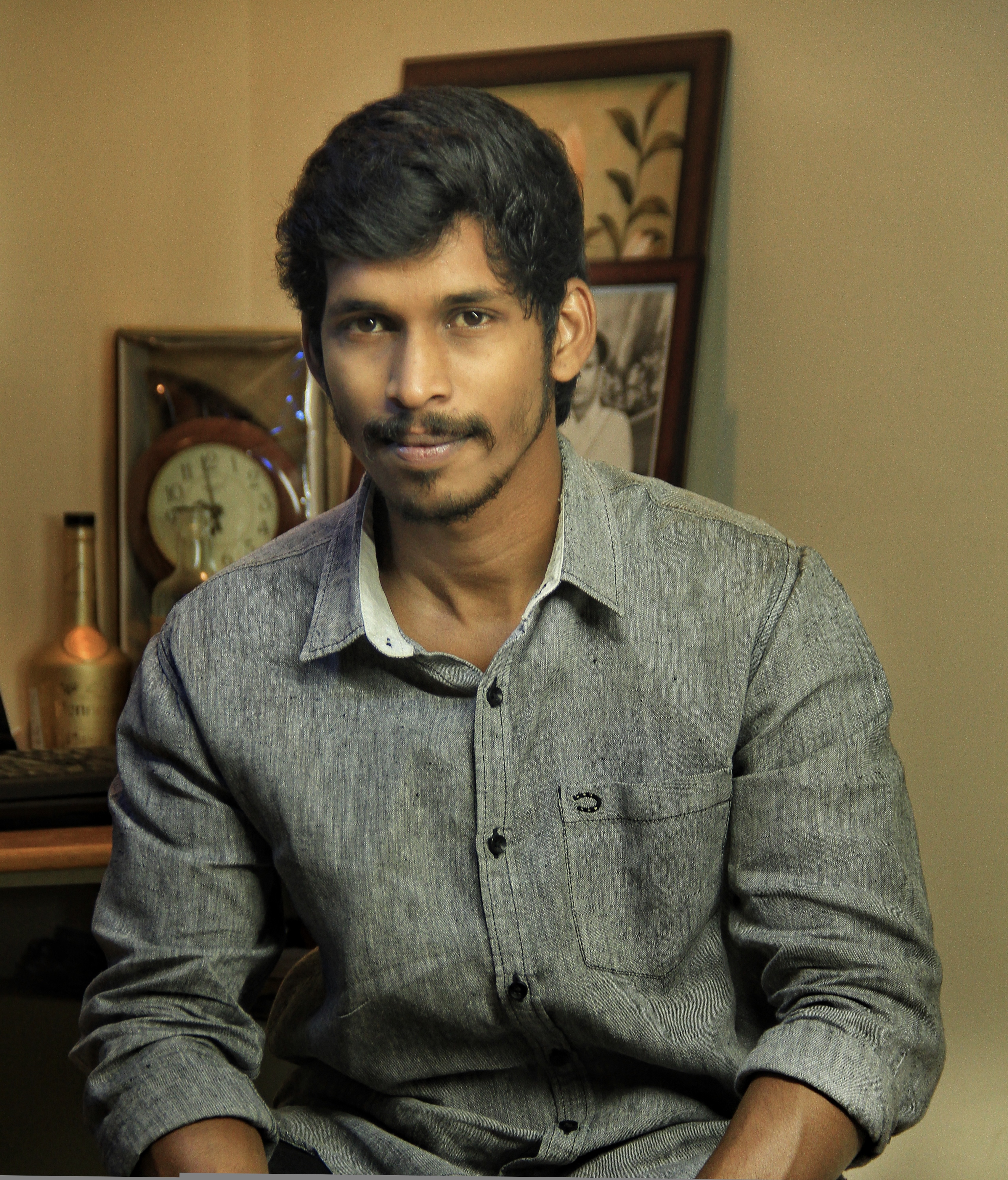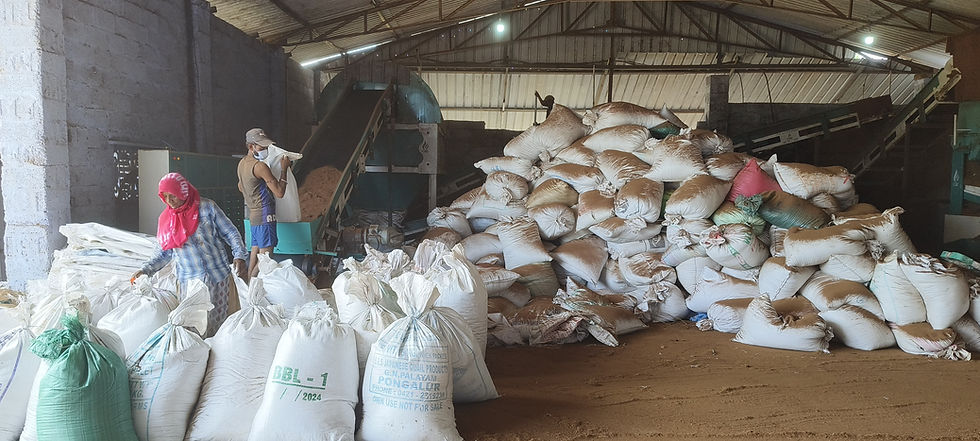Rising dengue, malaria cases reveal uncounted migrants in Tamil Nadu
- Prasanth Shanmugasundaram

- 6 hours ago
- 7 min read
Cases fuelled by cramped, unsanitary living conditions in factory-provided accommodations, and also visits to villages, say campaigners and doctors. Migrants seek Hindi-language medical camps.

Prasanth Shanmugasundaram

A stretch of asbestos-roofed coir factory migrant labour shelters near Kinathukadavu area in Coimbatore district. Prasanth Shanmugasundaram/The Migration Story.
COIMBATORE, Tamil Nadu: Arjun migrated from Bhaisamau village near Lucknow, Uttar Pradesh, five years ago to work in a coconut fibre factory in Pollachi in Tamil Nadu’s Coimbatore district. One morning in July 2025, the 30-year-old developed a high fever, had severe difficulty breathing, and nausea.
“I recovered after taking medicines for 14 days. Even when I contracted malaria, no one from the health department came to check on me,” he told The Migration Story, adding that no one from the government visited them, even when a relative contracted dengue.
According to Tamil Nadu’s official National Vector Borne Disease Control Programme (NVBDCP) protocol, a confirmed dengue or malaria case requires a field visit within 24 hours, larval source reduction, fogging where necessary, and testing of 50–250 contacts, none of which workers say happened.
Arjun’s story is far from unique. Local health officials in Coimbatore told The Migration Story that while the incidence of both mosquito-borne diseases was quite low among local Tamil residents, with dengue accounting for around 1% of the cases they treated, the situation among migrant workers was starkly different.
A doctor at a private hospital in Pollachi, speaking anonymously, said that many workers employed at coconut fibre factories come to them with fever. They added that they maintained a count over 27 days in August and found that four out of 20 had dengue and four out of 30 had malaria. “We sent them to the government hospital. Even when dengue occurs, they don’t get adequate medical help. By the time they come to the hospital, their platelet count drops to life-threatening levels,” the doctor said.
Karthikeyan, the District Communicable Disease Officer for Coimbatore, however, told The Migration Story that most of the malaria cases in the district were “imported cases”.
He added that on average, they had recorded 45–50 dengue cases and six to seven malaria cases every month. “When we inspect their housing, it is clear that they bring malaria back from their villages, making these imported malaria cases. Most of these workers are from Bihar, Madhya Pradesh, and Uttar Pradesh,” he said. He added that when anyone contracts malaria, they isolate them and test 250 people in the area continuously. “Similarly, dengue prevention measures are taken where needed,” he said.
Workers left to fend for themselves in poor living conditions
Most migrant workers live rough, with multiple families often sharing cramped cement-sheet or tin-roofed houses provided by their employers. Activists and labour unions have repeatedly criticised the Tamil Nadu government for failing to ensure safe and healthy living spaces, citing the risk of vector-borne diseases such as dengue and malaria that thrive in migrants’ overcrowded settlements or shelters. Kusumadevi, who works with Arjun, said that they left their village for lack of work. “We earn 250–400 rupees daily and do not have proper medical care. We live in cramped, overheated tin-roofed houses.” Doctors also said that lack of awareness and failure to isolate patients fuelled transmission.
Doctors at private and government hospitals in Negamam in Coimbatore and Udumalai in Tiruppur district shared with The Migration Story cases similar to Arjun’s. In private hospitals on the Pollachi–Udumalai border area of Devanoorpudur, doctors attributed the rise in cases to unsanitary living conditions, stagnant rainwater and migrants traveling back to villages as key factors.
Arjun said that a co-worker, Puneet, was the first in their company to be diagnosed with dengue. He said that the 28-year-old fell ill after he returned from his village in Uttar Pradesh in July and first visited a private hospital. “His platelet count was below 50,000, which doctors told us was life-threatening. We took him to the Pollachi government hospital. But due to the fear of his condition, he returned to his village after two days,” Arjun said, and added that even after contracting dengue, no health officials came to check on him and that he continues to work in his village to avoid a recurrence of fever.
Kusumadevi recounted that her relative, Desaraj, who also used to work in a coconut fibre factory in the Pollachi Vudukapalayam area, died in July. She said that he fell sick and had a fever for four days, and had visited the local government hospital, where he received injections. He went to the factory shelter, where he died after several days. “We do not know what type of fever he had,” she said.

Kusumadevi inside the coir-processing unit, where she and Arjun work, in the Pollachi belt of Coimbatore District. Prasanth Shanmugasundaram/The Migration Story.
Kusumadevi added that the language barrier often hinders them from seeking proper treatment. “Whenever we go to government hospitals, doctors do not understand us because we speak Hindi. If the government conducted medical camps with Hindi-speaking doctors once or twice a month, illnesses could be identified early, preventing deaths. The government should make this arrangement,” she told The Migration Story.
District officials admitted that no Hindi-language medical camps had been conducted so far, despite recognising communication barriers during treatment.
Invisibilized workers, unreported cases
The apparent rise in dengue and malaria cases also comes at a time when the state is seemingly faring much better than its counterparts in the country’s quest to eliminate malaria. According to the National Strategic Plan: Malaria Elimination 2023-2027, Tamil Nadu featured in Category 1—states with less than 1 new case for every 1,000 people in all districts. However, these statistics should be taken with a grain of salt, as the World Malaria Report of 2024, produced by the World Health Organisation, estimated 2 million cases in India in 2023, as opposed to the official figure of 0.22 million, indicating gross underreporting.
This snapshot provided by local health officials in Coimbatore reveals a larger malaise that affects Tamil Nadu. The state has among the highest number of migrant workers in India, according to the 2011 census, with large numbers of workers hailing from Maharashtra, Madhya Pradesh, Odisha, Uttar Pradesh, and Bihar.
Coimbatore, often referred to as the ‘Manchester of South India, is home to a significant number of migrant workers, with some labour unions estimating their numbers at about 10 lakh, while officials in Coimbatore peg their numbers at around 5 lakh.
The lack of data makes tracking and tracing diseases such as malaria doubly difficult. The state government does not have reliable data on the number of migrant workers or their living conditions. “Migrant labourers from northern states in Tamil Nadu are living under extremely harsh conditions. The government has never conducted any assessment or field survey regarding the state of their housing, workplace or sexual harassment or labour exploitation,” Henri Tiphagne, a human rights lawyer and Executive Director of The People’s Watch, a human rights organisation, told The Migration Story.

Arjun stands outside the asbestos-roofed shelter he lives in, a structure that barely shields him from heat or rain, in the Pollachi area of Coimbatore district. Prasanth Shanmugasundaram/The Migration Story.
Tiphagne added that during the COVID-19 pandemic, the then state government had referred to migrants as “guest workers.” But neither that government nor the current one had conducted any surveys after the pandemic. “It is absurd that, even five years after COVID, the government still claims to have no data about them. Is this what they call social justice? There is no information on how many of them exist or how they live,” he said.
Veera Raghava Rao, Secretary of the Tamil Nadu Labour Welfare Department, told The Migration Story that while the government had not yet surveyed the living conditions of migrant labourers, it had initiated a state-wide procedure to register them, in which they had registered over 12 lakh workers so far.
“We are ensuring that these workers receive government welfare schemes. Since they stay in one place for only three to six months, it is difficult to track their numbers and monitor them,” Rao said, adding that a comprehensive state-wide survey was being planned to assess their living conditions, the accommodation provided by factories, access to clean water, compliance with minimum wage laws, and the presence of exploitation or sexual harassment. “Once this survey is done, these issues will be addressed. Meanwhile, we will work with the health department to prevent the spread of dengue and malaria,” he said.
In August 2025, the government announced that it would soon conduct a survey to capture migration into the state as well as the working and living conditions of migrants.

Migrant labourers load and stack sacks inside a coir processing unit in the Pollachi area of Coimbatore district. Prasanth Shanmugasundaram/The Migration Story.
Thangaraj, Assistant Commissioner in the Tamil Nadu Labour Department, who has worked extensively on field-level registration drives, told The Migration Story that the registration of inter-state migrant workers has been slow because officials face multiple barriers during fieldwork. For instance, he said many migrant workers do not possess Aadhaar cards or any document that carries their address, making it impossible to register them in the state database. He added that many workers are illiterate and often do not know their own phone numbers. While the labour department has been able to collect details from factories and industrial units with the cooperation of their management, the situation is far more difficult at construction sites.
“Construction workers are afraid to share their details unless the site owner specifically instructs them to do so. If the owner is absent or unwilling, we cannot obtain Aadhaar or any valid documents,” Thangaraj said. As a result, the department can only register those migrant workers whose employers cooperate and provide basic identification details, leaving thousands outside the official records.
Shanmugam, Tamil Nadu State Secretary of the Communist Party of India (Marxist), which is part of the current state government, strongly criticised the government and employers for failing to protect migrant workers from the north, who he said were the backbone of Tamil Nadu’s factories. “Employers pack workers into cramped, unhygienic rooms and extract 12 to 14 hours of continuous work for meagre wages. Their profits grow while workers are left to suffer. Migrants cannot form unions because they are outsiders here. Their rights remain invisible.”
Shanmugam recalled several recent protests that highlighted the growing anger among workers. In September, workers at Kattupalli port near Chennai protested the death of a coworker from Uttar Pradesh and demanded compensation. The protest ended in a clash with the police. “These struggles are proof that migrants are being pushed to desperation. If Tamil Nadu does not conduct a proper census of migrant workers, documenting their living conditions, health risks, and exploitation, then employers will never be held accountable. Without strict monitoring, exploitation and disease will only spread further.”
Tamil Nadu Health Minister Ma. Subramanian dismissed the rise in cases of dengue and malaria among workers from the north. “As far as Tamil Nadu is concerned, dengue and malaria cases are very low. If such cases occur, we act immediately to prevent further spread. Claims that dengue and malaria are spreading among northern migrant workers are false accusations, just election-related rumours,” he told The Migration Story.
Prasanth Shanmugasundaram is a multimedia journalist based in Tamil Nadu. His work primarily covers social justice, equality, politics, climate change and crime.





Comments